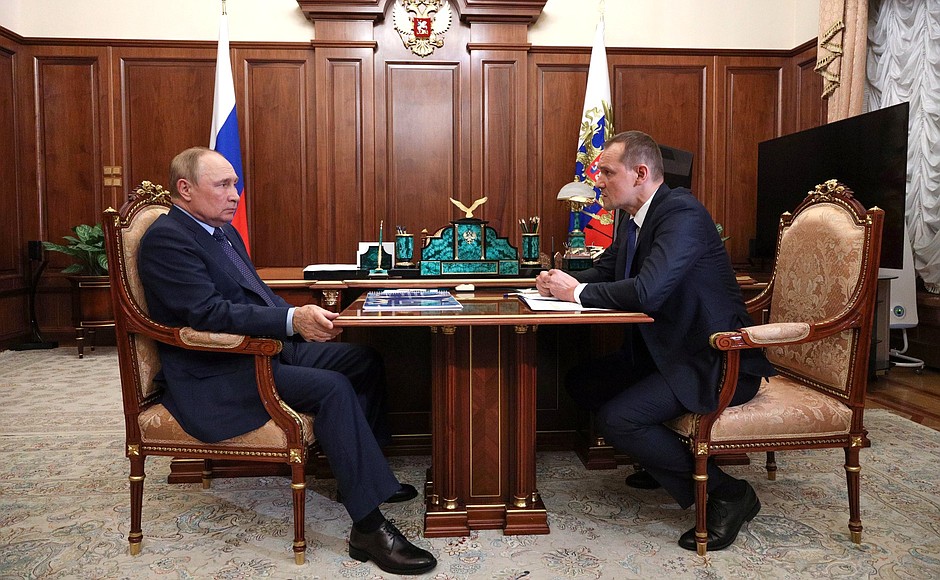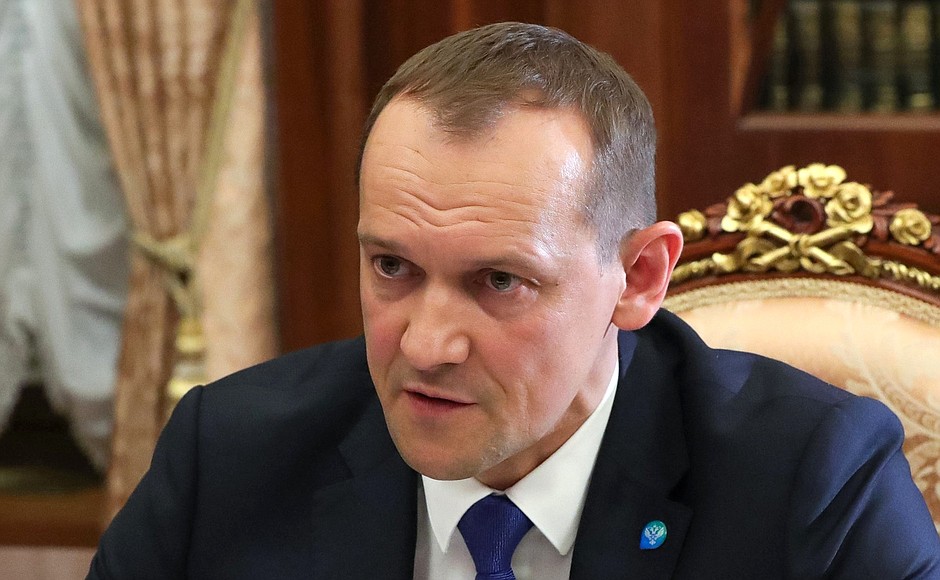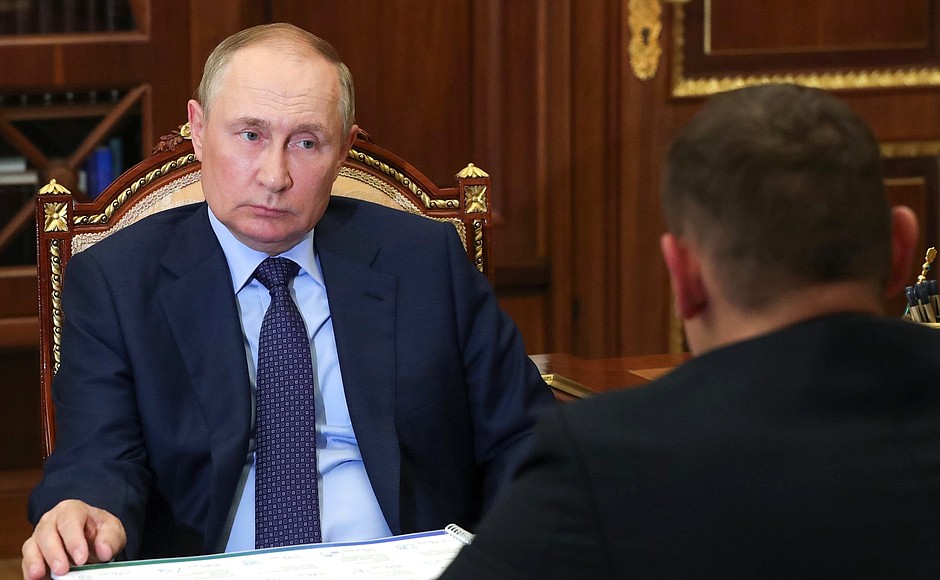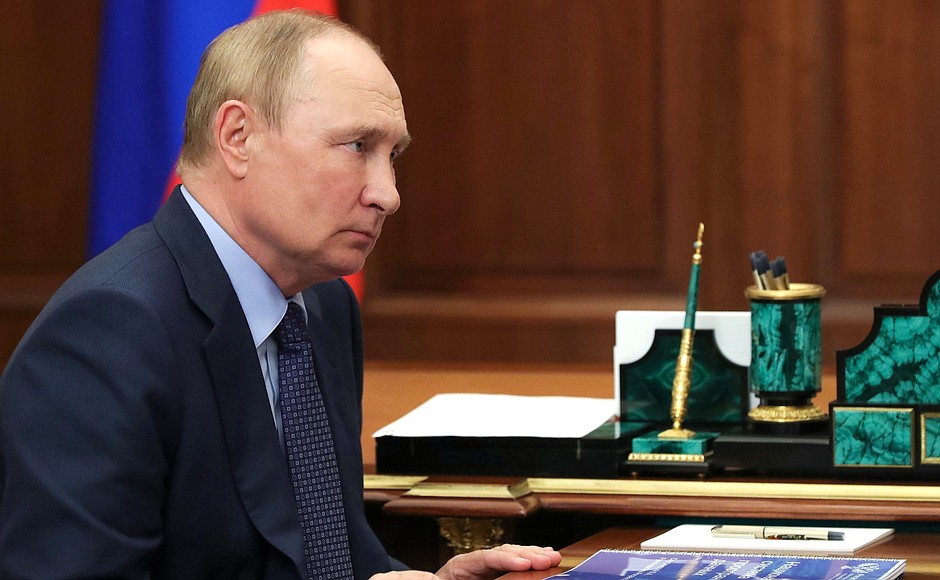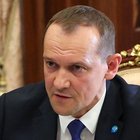President of Russia Vladimir Putin: Mr Skufinsky, as far as I know, budget revenues from registering real property rights, from your kind of activity, have been growing. You participate in two national projects. Tell me about each one of them.
Rosreestr head Oleg Skufinsky: Mr President, I would like to stress that Rosreestr’s initiative was behind the passing of 40 federal laws over the past two years. Incidentally, one of these was the garage amnesty law that was debated quite actively. Today, I would like to report that 80,000 Russian citizens have made use of this instrument and it is gaining momentum.
These tools also include a law on the extension of the ‘dacha amnesty’, a law on supporting gardeners, and a law on cutting the timeframes for rights registration, cadastral registration, and generally the investment and construction cycle. But the main objective pursued by the Service is, of course, to guarantee our people’s property rights.
I would like to report separately on protecting our citizens’ personal data from crime. A law to this effect was adopted last year…
Vladimir Putin: This is highly important, particularly in a digital environment.
Oleg Skufinsky: Absolutely, Mr President. A law was passed banning so-called spoof websites. In effect, these websites masqueraded as official portals of some or other agency, resold data, often incorrect, and misinformed people. Today, these websites are banned.
Yet another important law, which has also been approved, concerns protecting personal data. The first and last name and patronymic of a property owner can only be provided with his or her permission and consent. We believe that this is of fundamental importance, because there were a lot of instances of fraud. This law helps to protect our citizens’ personal data.
The law on the so-called land auctions. All the procedures will be carried out online and the timeframe for providing a plot of land will be cut by ten days. What is highly important is that following an auction, the contract will be signed strictly online, which will relieve people of the need to pay numerous visits to state agencies.
I would also like to report on the legislative initiatives we hope to adopt during the autumn session. There is an important bill on so-called ‘linear amnesty,’ which has also been developed on your instruction. This is a simplified procedure for registering networks, usually natural monopolies, which are used to meet the needs of our citizens'
The transition to fully electronic communication with legal entities from January 1, 2024, is an important initiative of ours, Mr President. The procedure becomes clearer, more transparent; and most importantly, it practically eliminates unreasonable delays in registration activities.
I would like to separately report on digitalisation because our agency is a digital one; we provide 250 million legally important services per year.
The transition to a single centralised system of cadastral registration of rights was another important task, completed on October 21, 2020. It was a rather complicated process, we have completed it, and today we are working in this single centralised system.
The second very important digitalisation task is to create an internal digital technology centre of excellence. Over the last 18 months, we have hired more than 350 highly qualified specialists, and we resolve any incidents that arise with information systems very quickly, without external contractors. This is very important for a system like ours.
I would also like to inform you that not all of our citizens use digital services: many go to integrated centres and get services there. Actually, almost half of them. We have carried out rather extensive work together with the Ministry of Economic Development and the regions, and switched to paperless workflow on June 29, 2022.
What is the result? Now we do not have 11 million paper files between the government service centres and us, which is approximately four football fields of archives created annually. Secondly, we reduced the logistics of exchanging paperwork between organisations by two days, reduced annual logistics costs by more than 500 million, and, as a result, reduced the time for rights registration and cadastral registration. Today, registration takes on average two days. For e-mortgages, by the way, it takes no more than 24 hours if the application is submitted electronically.
And, of course, I would also like to emphasise that housing construction is our absolute priority. A law, under which a developer submits documents for registration
on behalf of shareholders, entered into force last year. This is very convenient for the people. As a rule, the developer does it online. Today, the share of equity participation contracts submitted electronically amounts to 80 percent.
Vladimir Putin: What is a “house for a farmer”?
Oleg Skufinsky: Mr President, a “house for a farmer” is simply a paradox – a farmer engaged in agriculture could not build a house. To do this, he had to go through a lengthy procedure to switch his land from one category to another. Now this problem has been resolved. A farmer doing agricultural work can build a house for himself without any problem. We think we have addressed a very important social task.
I would also like to report that we addressed another very important task last year. We created an information system based on a domestic cartographic foundation, importantly, produced by way of import substitution. Using it, we provide information to both the authorities and interested organisations. Now we are using this foundation to create investment websites. I would like to emphasise that it is very important that this system was produced by import substitution and is legally meaningful. We are doing this work and hope to cover over half of the territory before the end of the year. Incidentally, we reduced the time for presenting this cartographic data five-fold. Before, we spent almost 20 days on this, and now it takes one or two days, depending on the inquiry. This is a very important task.
I would also like to report that last week we discussed an experiment on creating a single database on land and real estate. Following the Prime Minister’s instructions, last year we conducted an experiment in accordance with a Government resolution. We worked out technology with regional management teams and discussed the entire package of issues. In effect, we created a targeted model for the system’s development, for the resolution of historically accumulated problems. As a result, we drafted a strategic initiative on the national spatial data system under the guidance of Deputy Prime Minister Marat Khusnullin, who oversees this work.
I would like to thank you for supporting this initiative. It is very important that the state programme National Spatial Data System was endorsed on the basis of this initiative for the first time in the history of our department. This is a vital document that comprehensively and systematically addresses…
Vladimir Putin: It is necessary to fill up this system.
Oleg Skufinsky: Absolutely. The programme addresses key tasks. The first one is to create a federal state geodesic network that ensures precise engineering and cadaster calculations. The second task is to form a legally meaningful uniform electronic cartographic foundation of the country by way of import substitution. The third one is to create a full and precise registry. You are certainly right. Full and precise information is indispensable for making prompt and correct managerial decisions.
The third task is to create a uniform digital spatial data platform. By 2025, we will develop a platform around a Russian core. It will be fully based on Russian technology. We will launch this platform on the territory of the 20 best prepared regions.
I would also like to note that we will create 20 new services. These are very simple human services, for instance, Individual Housing Construction that will help people register their house through a process with three times fewer steps. Other services will include Urban Study, Land for Construction, Land for Tourism and Just Land. These services will help entrepreneurs resolve specific problems on the ground quickly and without any barriers.
Mr President, I would also like to note that we need people, professionals for resolving all these tasks. I think this is crucial because people are our number one priority – Rosreestr employs 60,000 people. Many of them have worked for a long time. We carry out social projects from time to time and we have revealed whole dynasties working in our system – some have worked for 65 years and others for 48 years. So, we have continuity of generations. In the past year and a half, we trained 27,000 specialists for the digital transformation. So, we retrained almost half of our employees.
I also want to note that working with young people is a special focus for us. A quarter of our employees are young people – a total of 15,000 people. They are involved in all strategic and social initiatives. They serve on the youth councils that we have established almost at every territorial body. We are working with them on a large scale. Importantly, we have agreed with the Ministry of Education and Science that the university for our field – Moscow State University of Geodesy and Cartography that is actually an engineering university…
Vladimir Putin: It is a good university.
Oleg Skufinsky: Yes, it has long-standing traditions. It has a college under its auspices, so we start educating specialists straight from school.
We will draft a special programme for training and retraining personnel. We are already deeply involved in this. This programme will make use of cutting-edge technology. In the next several years, we plan to retrain 3,500 of our specialists. These are the main priorities of our service.
Vladimir Putin: Good, thank you.
<…>
